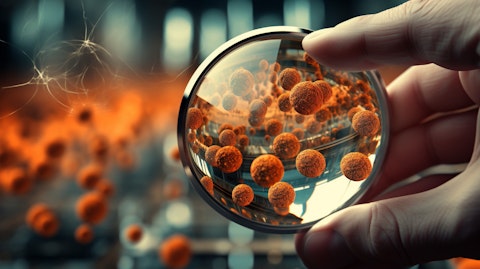In this article, we will be taking a look at the 2o foods to reduce cancer risk. If you do no want learn about the global and US cancer stats, head straight to the 5 Foods To Reduce Cancer Risk.
Global and US Cancer Statistics
According to data from the World Cancer Research Fund International, the year 2020 witnessed an alarming 18,094,716 new cancer cases worldwide, with an age-standardized incidence rate of 190 per 100,000 individuals. The rate was higher among men at 206.9 per 100,000 compared to women at 178.1 per 100,000. The most prevalent cancers globally included breast (12.5% of all cases), lung (12.2%), and colorectal (10.7%). Tragically, cancer claimed an estimated 10 million lives worldwide in the same year, representing the second leading cause of death globally after cardiovascular diseases, responsible for approximately 1 in 6 deaths. Moreover, the burden of cancer mortality weighs more heavily on less developed countries where access to early detection and quality treatment remains limited.
Shifting focus to the United States, the Centers for Disease Control and Prevention (CDC) reported a staggering 1,603,844 new cancer cases and 602,347 cancer-related deaths in 2020. This equates to an incidence rate of 403 new cases per 100,000 people and a mortality rate of 144 deaths per 100,000 people. Breast, lung, prostate, and colorectal cancers were identified as the most prevalent cancers in the US. Alarmingly, cancer ranks as the second leading cause of death in the country, trailing only behind heart disease and accounting for nearly 600,000 deaths annually. In terms of the economic toll, the US spent over $200 billion on cancer care in 2020.
Innovations in Cancer-Fighting Nutrition
If we talk about the upcoming global cancer burden, it is forecasted to escalate significantly, with projections from the World Health Organization indicating a rise to 35 million new cases by 2050, spurred by aging populations, unhealthy lifestyles, and environmental factors. Fortunately, research suggests that up to 40% of cancers are preventable through lifestyle modifications.
Researchers and the food industry are collaborating to explore innovative approaches in leveraging food and agricultural by-products for cancer prevention. These efforts include upcycling agri-food by-products rich in bioactive compounds like polyphenols and fiber to develop functional foods and nutraceuticals. For example, grape pomace extract and tomato by-product-based powders have shown promising anti-cancer effects against various cancer cells in vitro.
Moreover, food manufacturers are developing cancer-targeting functional foods, such as omega-3-enriched products and probiotic-containing foods, to address specific cancer risk factors and support patients. Precision nutrition approaches, tailored to individual genetic profiles and cancer subtypes, are also gaining traction. Studies have demonstrated the efficacy of personalized diets high in cruciferous vegetables in reducing prostate cancer risk.
Market trends indicate a growing oncology nutrition market, valued at $2.1 billion in 2022 and projected to expand at a CAGR of 6.2% from 2023 to 2031, reaching $3.6 billion.
Guardant Health, Inc. (NASDAQ:GH) leads in precision oncology with its liquid biopsy technology, offering non-invasive cancer detection and analysis. Its flagship products like Guardant360 and GuardantOMNI aid treatment decisions and disease monitoring. For advanced cancer, it guides targeted therapy selection; for early-stage cancer, Guardant Health, Inc. (NASDAQ:GH) Reveal predicts recurrence risk post-surgery. Guardant Health, Inc. (NASDAQ:GH)’s upcoming test, Shield, targets colorectal cancer screening. Financially, Q4 2023 saw 22.2% revenue growth to $155.05M, with precision oncology testing revenue up 25% to $142.19M. Adjusted EBITDA loss improved to $78.4M. Full-year 2023 revenue reached $563.95M, with a 25.5% YoY increase.
Illumina, Inc. (NASDAQ:ILMN) is a leading biotech company known for its contributions to cancer research. They offer innovative cancer panels and assays like TruSight Oncology 500 and AmpliSeq, enabling the analysis of genetic variants in various cancer types. Their benchtop sequencing systems, such as MiSeq and MiniSeq, coupled with intuitive data analysis software, facilitate accurate sequencing and analysis. Illumina, Inc. (NASDAQ:ILMN)’s technologies drive precision oncology by detecting genetic alterations, estimating tumor mutational burden, and monitoring circulating tumor DNA. Collaborations with institutions like Memorial Sloan Kettering Cancer Center accelerate genomics-based approaches in cancer care. In Q4 2023, Illumina reported a revenue of $1.12 billion, up 4% from Q4 2022, and shipped 79 NovaSeq X instruments. Despite a 2% revenue decrease for fiscal year 2023, Illumina, Inc. (NASDAQ:ILMN) remains a key player in advancing cancer research and treatment.

A hand holding cancer cells with a magnifying glass, highlighting the company’s target of curing diseases.
Our Methodology
For our methodology, we used a thorough method to evaluate the best foods to reduce cancer risk, focusing on their quality and effectiveness. Our approach involved carefully considering various factors and reaching a consensus based on sources like Medical News Today, Healthline, and MD Anderson Cancer Center. We selected foods that appeared in multiple sources and one appearence qualified a food for 1 point and only those foods were selected which appeared at-least twice across multiple sources we sifted through. After that, we summed up the scores for the foods in our consensus and ranked them. Then, we scored them on the basis of their rankings. The top one received a score of 1 (20/20 = 1), the top 2nd one received a score of 0.95 (19/20 = 0.95) and so on.
After conducting a comprehensive analysis, we have created a definitive ranking of foods to reduce cancer risk. This ranking showcases the foods to reduce cancer risk, listed in ascending order based on their scores.
Here is our list of the 20 foods to reduce cancer risk.
20. Lean Chicken or Turkey
Insider Monkey Score: 0.05
Lean chicken and turkey are recommended for reducing cancer risks due to their lean protein and lower saturated fat content compared to red and processed meats. Studies show that substituting poultry and fish for red meat can lower the risk of colorectal, esophageal squamous cell, liver, and lung cancers. Limiting red meat consumption to 3-4 times a week and opting for lean cuts is advised. Individuals who consume meat five times or less per week, or follow a vegetarian or vegan diet, have lower cancer risks.
19. Wild Rice or Brown Rice
Insider Monkey Score: 0.1
Brown rice, with its nutrient-rich bran and germ layers, is preferred over refined white rice for its cancer-fighting properties. Studies show it’s not associated with increased cancer risk and may reduce precancerous lesions and tumor incidence, attributed to its antioxidants and phytic acid content. Similarly, wild rice, despite not being true rice, offers similar benefits. It can lower risk factors for heart disease, inhibit breast cancer cell growth, and is associated with lower colorectal cancer risk due to its high nutrient density and anthocyanin content.
18. Eggs
Insider Monkey Score: 0.15
Eggs are rich in choline, antioxidants like lutein and zeaxanthin, and essential nutrients such as vitamin D, selenium, and vitamin B12, which places them among the foods to reduce cancer risk. Choline aids in cell membrane health and DNA methylation, while antioxidants combat oxidative damage and inflammation, contributing to cancer prevention.
17. Leafy Greens
Insider Monkey Score: 0.2
Leafy greens like kale, spinach and cabbage are rich in folate, carotenoids, and vitamin C which are highly critical for cancer prevention, particularly colorectal cancer. Folate helps reduce bowel cancer risk by 9%, while carotenoids act as antioxidants that protect cells from DNA damage. Cruciferous vegetables like kale contain glucosinolates, which break down into compounds with anti-inflammatory and anti-cancer effects. Studies show a strong link between folate-rich foods and reduced bowel cancer risk, with men showing an 11% lower risk, compared to women at 6%
16. Oranges
Insider Monkey Score: 0.25
Citrus fruits like oranges are highly rich in vitamins, antioxidants, and anti-inflammatory compounds which makes them one of the top foods to reduce cancer risk. Vitamin C and flavonoids inhibit tumor growth, while compounds like hesperidin and limonene have anti-inflammatory effects. Regular consumption, about 3-4 times per week, helps lower the risks of lung, colon, and breast cancers. Oranges have a high vitamin C content that boosts immune function, aiding in cancer prevention. Population studies confirm frequent citrus fruit consumption reduces cancer risk by 40-50%.
15. Green Tea
Insider Monkey Score: 0.3
Green tea is rich in polyphenols like EGCG and is studied for its potential to reduce cancer risks. For example, consuming over five cups of green tea daily has shown benefits in breast cancer patients. Studies have also highlighted protective effects in prostate cancer patients.
14. Canola Oil
Insider Monkey Score: 0.35
Studies indicate that canola oil may be useful in preventing the growth of breast cancer cells and lowering the formation of colon tumors. Studies reveal that it causes cell death and upregulates the production of apoptotic proteins in breast cancer cells. Additionally, it improves the prevention of cancer growth when used in conjunction with chemotherapy medications. Because of its higher amount of omega-3 fatty acids and lower expression of COX-2, dietary canola oil has been demonstrated to minimize tumor incidence and multiplicity when it comes to the prevention of colon cancer when compared to maize oil.
13. Dark Chocolate
Insider Monkey Score: 0.4
According to research, dark chocolate is high in flavanols which may help prevent cancer by reducing inflammation and shielding cells from harm. On the other hand, regular eating of some dark chocolate bars may pose health hazards due to the presence of heavy metals like lead and cadmium. Antioxidants present in dark chocolate may help lower the risk of cancer, although this isn’t proven. The best way to consume dark chocolate is in the context of a well-balanced diet high in plant-based foods, with exercise adding to the overall health advantages.
12. Fatty Fish
Insider Monkey Score: 0.45
Incorporating fatty fish in your diet, which is high in omega-3 fatty acids like EPA and DHA, protects against liver, colorectal, and breast cancers. The more you consume fish, the less you are exposed to the risk of colorectal and breast cancer, according to meta-analyses. A 6% decreased risk of liver cancer is linked to every 20 grams of fish consumed daily. Fish is one of the best foods to reduce cancer risk.
11. Garlic
Insider Monkey Score: 0.5
Garlic contains Allicin, a sulfur-containing component that is well known for its ability to lower the risk of cancer. It helps lessen inflammation, triggers the death of cancer cells, stops the growth of tumors, and strengthens the immune system. Higher garlic consumption is associated with a lower incidence of stomach, colon, prostate, and breast cancers, according to epidemiological research.
10. Tomatoes
Insider Monkey Score: 0.55
Tomatoes are widely researched for their potential to prevent cancer, due to their high lycopene content, particularly prostate cancer. According to research, eating a lot of tomatoes or lycopene can cut your risk of prostate cancer by up to 40%. Tomatoes may reduce the incidence of stomach, lung, and colorectal cancers, according to additional research.
9. Flaxseeds
Insider Monkey Score: 0.6
Omega-3 fatty acid, lignan, and dietary fiber-rich flaxseed may lower the incidence of colon, prostate, and breast cancers. Research has demonstrated its capacity to inhibit the growth and multiplication of cancer cells. Daily ingestion appears to reduce cancer indicators according to human experiments. The potential financial benefits of flaxseed in preventing cancer are significant, as the global flaxseed market is expected to grow to $695 million by 2026.
8. Turmeric
Insider Monkey Score: 0.65
Curcumin, the main ingredient in turmeric, targets several cell signaling pathways and has shown promise in the prevention and treatment of cancer, placing turmeric among the foods to reduce cancer risk. It causes apoptosis, limits cell division, lowers inflammation, and suppresses angiogenesis. Research shows that it may have an impact on the onset and spread of cancer.
7. Olive Oil
Insider Monkey Score: 0.7
A meta-analysis of 45 studies published in PLOS ONE suggests that olive oil has shown promising potential in lowering the risk of cancer. An association between high olive oil consumption and a 31% decreased risk of cancer was found in research, which comprised case-control and cohort studies. Particular cancer types, including those of the breast, gastrointestinal, upper aerodigestive, and urinary tract, were also protected against. Olive oil is said to prevent cancer by selectively inducing the death of cancer cells while leaving healthy cells untouched.
6. Nuts
Insider Monkey Score: 0.75
Nuts are becoming highly recognized for their potential to combat cancer because of their rich nutrient profile. Their antioxidants, such as polyphenols and vitamin E which are the two factors that are connected to the development of cancer, help fight inflammation and oxidative stress. Regular nut eating was linked to a 32% lower risk of breast cancer in postmenopausal women.
Click to see and continue reading the 5 Foods To Reduce Cancer Risk.
Suggested Articles:
- 20 States with the Highest Cancer Rates
- 21 Countries that Have the Highest Rates of Cancer Deaths
- 15 Best Hospitals for Cancer Treatment in the US
Disclosure. None: The 20 Foods To Reduce Cancer Risk is originally published on Insider Monkey.





